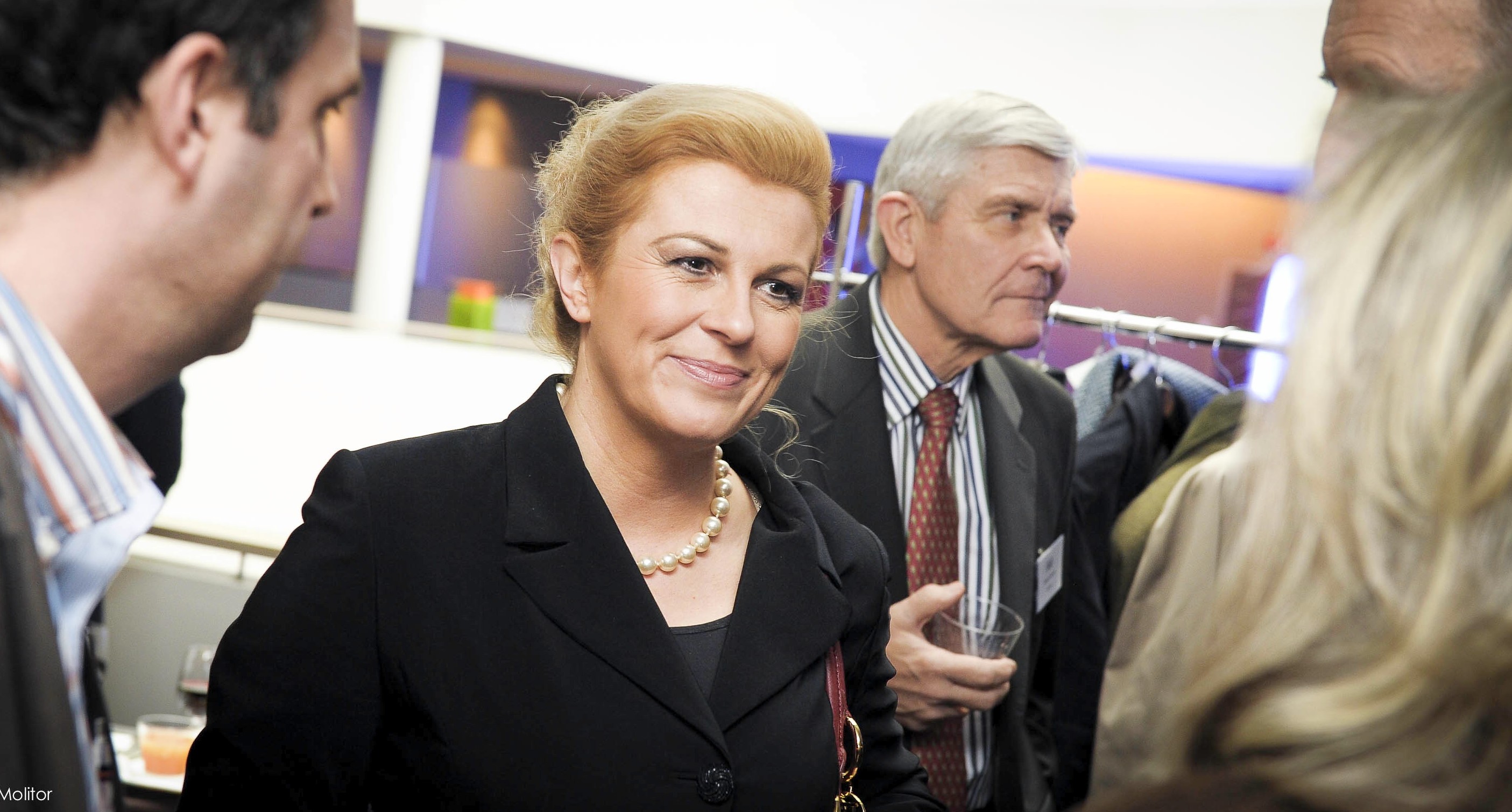On January 11, Kolinda Grabar-Kitarovic was elected Croatia’s first female president in a close 50.4 percent to 49.6 percent vote against outgoing head of state Ivo Josipovic. Despite being a relatively young country, Croatia, as of January 11, has become the twenty-third country in the world to elect its first female president, besting countries multiple times its age. So far, few articles in English have been written about the newly elected Croatian president, but among them a recurring theme stands out: the public considers Grabar-Kitarovic to be a positive change of pace from her predecessor and also noticeably attractive. One example of talk focused around her looks is a Reddit thread that emerged after her election, began simply with a photo posted of Grabar-Kitarovic in a bikini. She also quickly climbed to #11 on the “Hottest Heads of State” list. Grabar-Kitarovic’s femininity is clearly an integral part of her public perception and image.
Grabar-Kitarovic is not new to the international political scene. She was European affairs and foreign minister from 2003 to 2008, after which she became Croatia’s ambassador to the United States until 2011. Then, she was named NATO Assistant Secretary General for Public Diplomacy, also becoming the first woman to claim that post. A member of the conservative party, the Croatian Democratic Union (HDZ), and a “devout Catholic,” Grabar-Kitarovic has publicly stated that she supports gay rights, the legalization of medical marijuana, and abortion rights, marking her as a definitive moderate within the party.
When asked “if the media and public treated her differently because she was a woman, [Grabar-Kitarovic] responded in the affirmative,” and said that she was “surprised” by the lack of denunciation of the criticism of her. In this respect, Croatia proves to be a similar case to Poland, which in 2014 elected the country’s second female Prime Minister, Ewa Kopacz. During both Kopacz and Grabar-Kitarovic’s campaigns for leadership, the media and public focused on the women’s gender and feminine demeanor, commenting and critiquing their wardrobes and their words through a gendered lens.
For Grabar-Kitarovic, her fashion choices were faux pas. One Croatian news source commented, “Fashion experts have often criticized Grabar-Kitarovic over her rather tight outfits, her hair tied up in a chignon and the false lashes she does not want to give up.” On the other hand, for Ewa Kopacz, her feminine rhetoric proved controversial. She sparked criticism with the statement that she would respond to conflict with Ukraine like a “reasonable Polish woman.” The Huffington Post remarked, “Guffaws ensued. Domestic commentators found it an artless attempt to play the gender card; to foreign ears, it just sounded dated and vaguely sexist.” For the most part, the backlash to Kopacz’s comment seemed to reveal a deeper, underlying lack of tolerance in Poland for femininity in the public domain. And based on the reactions to Grabar-Kitarovic, it appears—to some extent—the same prejudice is at play in Croatia.
Sexist judgment of Grabar-Kitarovic on the basis of her looks extends beyond her country’s borders and beyond Eastern Europe, where the Polish and Croatian presidents preside. Indian Justice Markandey Katju recently said that beautiful women should be elected as politicians only to provide “momentary happiness [from] looking at her face in the media,” and then added, “Croatia, which has an ailing economy, has elected a beautiful woman, Ms. Grabar-Kitarovic, as its President. I am always in favor of electing beautiful women, like film actresses, on all posts…”
What is to blame for this widespread, lingering sexism? Some suggest that, in Croatia’s case, perhaps the transition out of communism has served to preserve prejudice. Croatian author Davorka Matic comments, “The dissolution of the ideological framework that formally guaranteed gender equality also meant the end of the politics of gender equality, which was seen [especially during the Nationalist movement]…as destroying the Croatian family and pushing women to find employment and work outside the home.” Communism encouraged women to find employment, thereby promoting and enforcing a framework that encouraged gender equality. So when Croatia shed communism, an ideological shift resulted, pushing Croatia back “to the archaic culture on the coattails of nationalist nostalgia for traditions.”
However, despite its complicated history, with the election of Grabar-Kitarovic Croatia has beaten the United States—among the majority of the world’s countries—to electing a female president. This raises the question of whether Croatia’s troubled history has, in a perverse way, served to help accelerate its growth by forcing it to actively acknowledge and overcome the structural and ideological barriers to gender equality in the country.
After joining the EU in 2013, Croatia quickly raced to meet a variety of norms, among them the alignment of its gender policies with European standards. The country put structures in place to achieve this goal, such as the office of “Gender Equality of the Croatian Government” and the “Gender Equality Ombudsperson” among others that serve to promote the standards laid out by the 2011 National Policy on Gender Equality, which outlines goals to achieve greater professional and political equality between the sexes.
Studies reveal that Croatian gender equality, while still lagging, is improving in a number of ways—including increasing political participation and higher education rates for women. Given that it is one of the world’s youngest countries, this development speaks positively to its future and continued progress. What’s more, with the election of a female president, Croatia has proven that women can break through the glass ceiling to achieve the highest position of power possible, false eyelashes and all. And although from statistics about gender equality in the country to the critical rhetoric regarding Grabar-Kitarovic’s femininity, there are many factors that make it clear that Croatia still has a way to go toward eliminating gendered politics, Grabar-Kitarovic’s election is certainly a step in the right direction.
